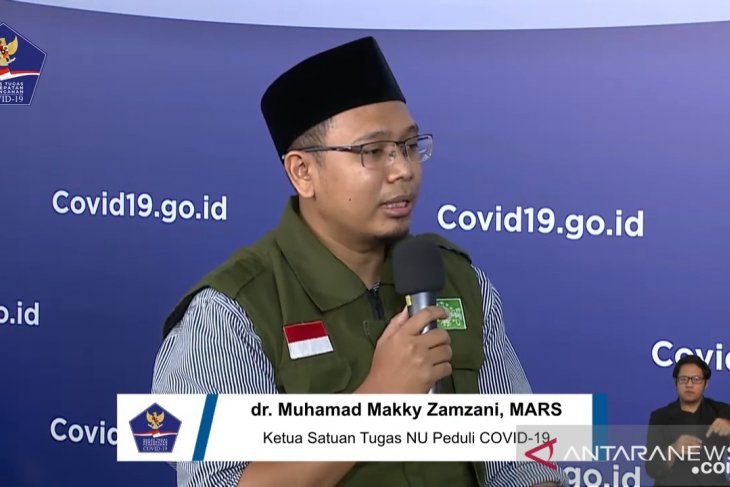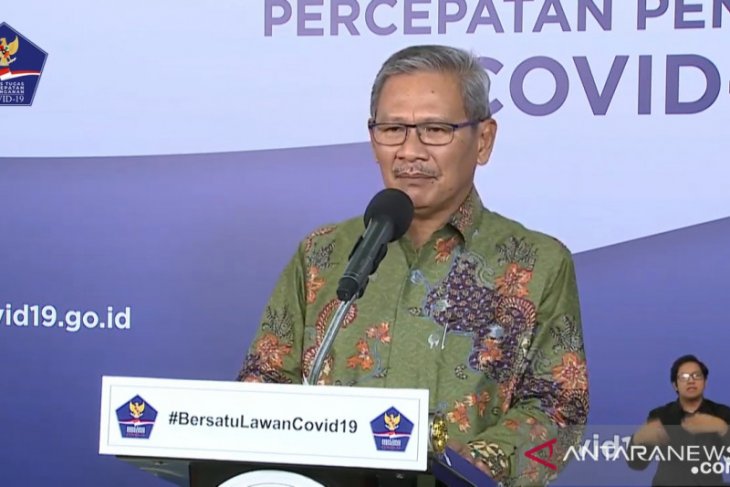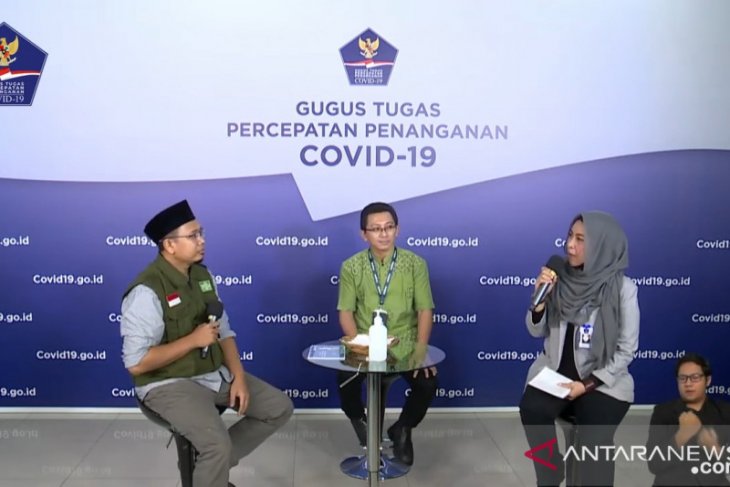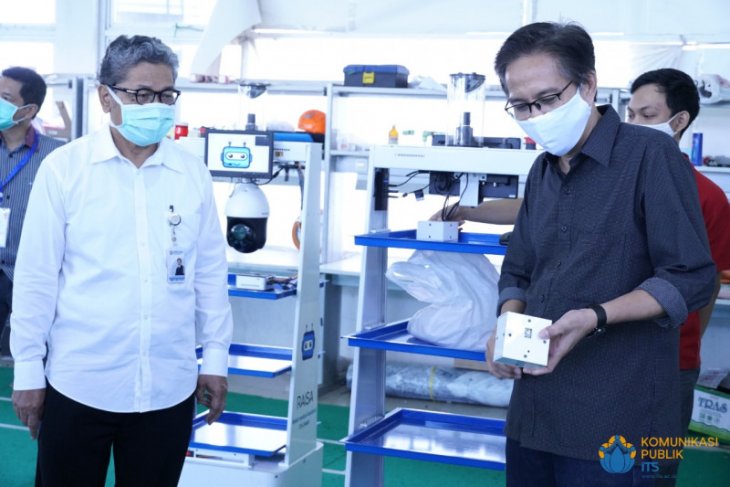Live Streaming
Program Highlight
Company Profile

Ani Hasanah
May

Chairman of the NU's task force for COVID-19, Muhamad Makky Zamzani, speaks at an online discussion on "Support of Religious Organizations and Volunteers of United Indonesia”, held in Jakarta on Thursday. (May 14, 2020). (ANTARA)
Indonesia’s largest Muslim organization, Nahdlatul Ulama (NU), has been working with the wider community to produce masks, as one of the steps to deal with the coronavirus pandemic, through its task force for COVID-19.
"The pandemic has also had an economic impact, so we have empowered around 200 people to make cloth masks," chairman of the NU's task force for COVID-19, Muhamad Makky Zamzani, said during an online discussion on the theme "Support of Religious Organizations and Volunteers of United Indonesia”, held on Thursday in Jakarta.
In addition, the Islamic organization has helped create an economic network by providing around 20,000 staple foods, with a target of increasing it to 100,000 staple foods.
"At present, there are only 20,000 staple foods (that we have distributed), and we hope that in the next few months, (the requirement for) 100,000 staple foods can be met (by us) to help the government in general," Zamzani said.
NU is implementing programs related to handling COVID-19 with the help of its task force. The task force can disseminate information more quickly, both to Islamic boarding schools and the wider community, including Islamic study groups, according to the organization.
The NU Task Force for COVID-19 has released 91,729 posters, five guidebooks, 10 videos, and various other media.
In addition, it has conducted 614 training sessions for a total of 10,478 people, 5,912 socialized villages, 1,336 village action plans, and 1,092 volunteers.
“There are 1,092 national volunteers registered in our database. But, there are also those in the regions who have not submitted their numbers in general, I am sure there are more than 10,000 people," he said.
The Ministry of Communication and Informatics had earlier appealed to the Indonesian public to continue spreading positive messages related to COVID-19 and remain optimistic and united in the fight against the pandemic.
"We must spread positive knowledge, and the foundation for that is we have to maintain optimism," director general of Public Information and Communication at the Ministry of Communication and Informatics, Widodo Muktiyo, said at a virtual discussion forum on Wednesday in Jakarta.
The COVID-19 pandemic, he said, needs to be tackled with positive thoughts, without pointing fingers at anyone. Self-discipline also needs to be practiced while using social media, and, at the same time, people must work together to help each other during this difficult time, he added.
"Let us set aside our ego because we are facing one common enemy which is the coronavirus. So, we should not put the blame on anybody, especially among ourselves," he urged. (ANTARA)
May

Government spokesperson for COVID-19 handling, Achmad Yurianto. (ANTARA))
Some 231 COVID-19 patients in Indonesia recovered in the past 24 hours, thereby taking the total count of recoveries to 3,518 out of 16,006 confirmed coronavirus cases, as of Thursday afternoon, a government spokesman remarked.
"The number of patients dying of the disease reached 1,043, while the number of patients under surveillance (PDPs) touched 33,672, and people under surveillance (ODP) reached 258,639," Achmad Yurianto, government spokesperson for COVID-19 handling, stated at the National Disaster Mitigation Agency (BNPB) Building in Jakarta on Thursday.
Based on data from each province in the country, most ODPs and PDPs were monitored. Some of the PDPs were monitored and tested negative for COVID-19, he remarked. In comparison with the previous day, the number of confirmed coronavirus cases and deaths increased on Thursday. Indonesia recorded 568 new cases and 15 deaths as of Thursday afternoon.
In response to the surge in the number of new cases on Thursday, he noted that the number of new cases in provinces having a large test gap will rise rapidly.
Citing an example, Yurianto noted that Southeast Sulawesi had recorded 91 more new cases on Wednesday. The samples originally planned to be sent to the South Sulawesi provincial capital of Makassar were checked in the province. Hence, as a consequence, Southeast Sulawesi recorded no new cases on Thursday.
Yurianto remarked that the COVID-19 pandemic had spread to all 34 Indonesian provinces, while the number of affected districts and municipalities rose by three to reach 382 as compared to the previous day.
As of Thursday, the health authorities had tested 173,690 swab samples. The swab testing is a combination of the polymerase chain reaction or PCR method and rapid test methods.(ANTARA)
May
 Screen-captured picture of NU's Muhamad Makky Zamzani (left) and Muhammadiyah's Corona Rintawan (middle) during an online discussion relating to COVID-19 handling held in Jakarta, Thursday, May 14, 2020. (ANTARA)
Screen-captured picture of NU's Muhamad Makky Zamzani (left) and Muhammadiyah's Corona Rintawan (middle) during an online discussion relating to COVID-19 handling held in Jakarta, Thursday, May 14, 2020. (ANTARA)
Nahdlatul Ulama (NU) and Muhammadiyah, the largest Muslim organizations in Indonesia, are currently promoting a handwashing facility program to avoid coronavirus transmissions among community members.
"We are currently driving this on a massive scale. During the 20-second-rule of handwashing, we could recite Al-Fatihah as it fits the duration," Doctor Muhamad Makky Zamzani, team leader of NU care for COVID-19, remarked during an online discussion held in Jakarta, Thursday.
The program should be applied, especially in hotspots of mass gatherings of people, including markets, though it necessitates the people's contribution to comply with the health protocol, as they may provide water or soap for a refill.
"It is quite difficult since the facilities are located in an open space. Thus, we urge people to refill the water regularly," Zamzani affirmed.
Doctor Corona Rintawan, an official of the Muhammadiyah COVID-19 Command Center (MCCC), stated that the organization's task force is ensuring the massive program to run for at least the next three months, while it also records the people's submission.
The submission indicator will be presented in terms of the percentages as a result of the monitoring process undertaken by Muhammadiyah volunteers.
"It is for the next three or four months, as through this program, the people would not only be encouraged but also observed. Hence, we will know whether it is effective," Rintawan expounded.
Apart from the wash hands program, NU and Muhammadiyah are working together to take precautionary measures and continue to urge people to not return to their hometowns for the Ramadan exodus. (ANTARA)
May
 Director of Airlangga University Hospital Prof. Nasronudin (left) and Rector of ITS Prof Mochamad Ashari at the launch of RAISA at the ITS campus in Surabaya, East Java, on May 8, 2020. ANTARA
Director of Airlangga University Hospital Prof. Nasronudin (left) and Rector of ITS Prof Mochamad Ashari at the launch of RAISA at the ITS campus in Surabaya, East Java, on May 8, 2020. ANTARA
Research and Technology Minister Bambang P. S. Brodjonegoro lauded the development of a medical assistant robot named RAISA to aid medical workers in treating COVID-19 patients and minimizing contact with sufferers to reduce disease transmission.
RAISA, which stands for Robot Medical Assistant ITS-Airlangga, was developed as a result of the efforts of a joint team from the November 10 Institute of Technology (ITS) and Airlangga University, involved in the Consortium COVID-19 established by the Research and Technology Ministry/National Research and Innovation Agency.
"I praise the work, not only the initiator but also those involved in the development and the users. It seems that it will become a standard to be followed in the treatment of COVID-19 patients, with limited number of medical workers. The robot is expected to become a complement for medical workers," Bambang stated during an online seminar in Jakarta on Thursday.
The 1.5-meter-tall RAISA is operated with a joystick remote control and is equipped with four trays to carry up to 50 kilograms.
The Wi-Fi controlled robot has a 0.85 kWh battery that can operate for up to eight to 10 hours. It can be used to treat patients in the intensive care unit (ICU) and high care unit (HCU), including for unconscious patients.
ITS Rector Prof. Mochamad Ashari expounded that RAISA was developed to help medical workers and reduce the potential of COVID-19 transmission through direct interaction with patients.
RAISA was initially developed to facilitate the treatment of patients in isolation by providing services, such as carrying food, clothing, and medicines.
Furthermore, the robot was developed to monitor the patients' condition, such as checking their pulse, body temperature, and oxygen saturation level.
The robot has a built-in high-resolution camera capable of swiveling 360 degrees to effectually and directly monitor the condition of COVID-19 patients.
Currently, the robot has been used and operated at the Airlangga University Hospital (RSUA).
RSUA Director Prof. Nasronudin explained that the robot will help the hospital to treat and monitor patients, but it would not replace human medical workers.
"This robot is useful to protect medical workers and reduce patients' mortality and morbidity," he added. (ANTARA)

